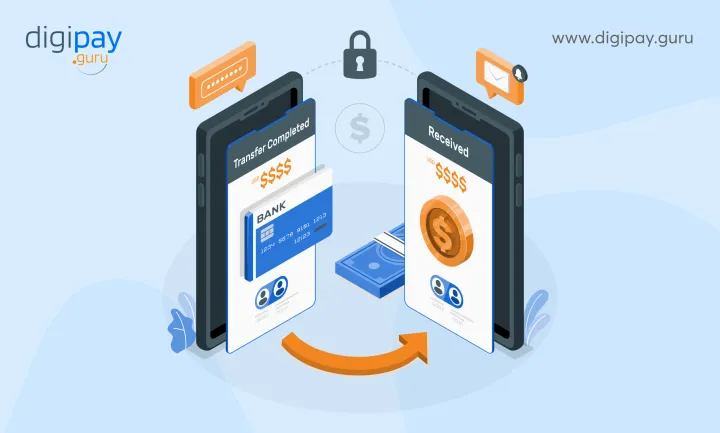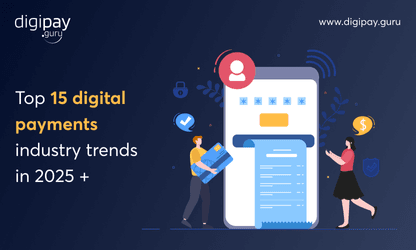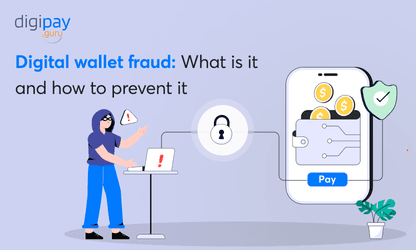In the digital age, our digital wallets have become vital for managing finances and protecting sensitive information. As digital wallets become more mainstream, proper security is critical. And as reported, the global payment fraud is expected to reach $40.62 billion by 2027.
In this guide, we’ll provide actionable tips on foolproof digital wallet security. You’ll learn best practices like using strong passwords, enabling two-factor authentication, avoiding phishing scams, monitoring your accounts, and more. Follow these proactive measures, and you can feel confident your sensitive information and money remain secure, instead of a constant worry.
We’ll show you how to secure your digital wallet step-by-step. Maintaining vigilance with your digital security is an ongoing process, but it is essential to safeguard your hard-earned assets in the modern landscape.

Understanding Digital Wallets and Their Security Risks
A digital wallet allows you to store and manage your cryptocurrency funds through desktop, mobile, web, and hardware platforms. However, is a digital wallet safe with inherent security risks? This must be understood in order to properly safeguard your assets.
What is a Digital Wallet And Is It Safe?
A digital wallet is a software application or hardware device that provides a personal interface for accessing and making transactions with your cryptocurrency holdings. There are several types of digital wallets including desktop, mobile, web, hardware, and paper wallets. Examples of some of the best secure digital wallets include Exodus, MetaMask, and Ledger wallets.
Common Security Risks
The common digital wallet security risks include:
Phishing Attacks
Phishing attacks attempt to trick users into providing wallet login credentials or personal information through fraudulent emails, websites, or apps. These sophisticated scams can drain even the best secure digital wallet if you inadvertently provide access.
Malware and Viruses
Malicious software like keyloggers or viruses on your devices can compromise wallet accounts and passwords. Keeping software updated and using antivirus protections is critical.
Social Engineering
Criminals may attempt to manipulate you through social media or other channels to gain access to wallet funds. Avoiding scams and being wary of requests is key.
Lack of Device Security
If your phone, computer, or hardware wallet is ever lost or stolen, unauthorized access becomes much easier. Having strong device passwords and locking your hardware wallets is important.
Understanding these common risks allows you to take proactive steps to secure your digital assets and avoid becoming a victim of theft or hacking.
Best Practices for Securing Your Digital Wallet
Digital wallet security is essential to protect your cryptocurrency assets. Follow these key tips to keep your funds safe.

Implementing Strong Password Management
Use randomly generated passwords containing upper and lowercase letters, numbers, and symbols. A strong password could be "Ks27Yj#81mH" for example. Change your passwords regularly, at least every 90 days. Never reuse the same password across different accounts or sites. Enable two-factor authentication via a secure wallet app for an extra layer of protection beyond just a password.
Keeping Software and Devices Up-to-Date
Continually update your wallet software, operating systems, internet browsers, phone firmware, and antivirus software. These patches are known vulnerabilities as they are discovered. Run frequent full system scans with your antivirus to detect potential malware or keylogger infections. Keeping software updated is one of the best defenses for the best secure digital wallet.
Using Hardware Wallets for Additional Security
Dedicated hardware wallets like the Ledger Nano X provide offline cold storage and transaction signing for greater security. This isolates your private keys from your internet-connected devices vulnerable to hacking. Set a strong PIN code on the device and properly secure the recovery seed.
Backing Up Your Digital Wallet Properly
Always maintain recent backups of your secure digital wallet to avoid losing access to funds due to device failure, loss, or other issues. Only backup to encrypted external drives or paper copies stored securely - never digitally in the cloud. Test restoring from the backup before deleting wallet data.
Avoiding Suspicious Links and Downloads
Exercise caution when receiving communication asking you to click links or download files, which could be phishing attempts. Double-check the sender address, links, and file extensions before clicking or opening. Use trusted antivirus protections.
Securing Your Mobile Wallet
A secure digital wallet is a must for digital payments. You can use app locking, biometric authentication like fingerprints, and remote wipe capabilities in case your phone is lost or stolen. Going for an already best secure digital wallet can also help with extra layers of security. Enable transaction signing and avoid using public WiFi networks that could expose your activity.
Store Your Recovery Phrase Securely
Carefully hand-write wallet recovery phrases on paper and keep them in a secure, secret offline location like a safe or safe deposit box. Never digitally store them such as taking photos or typed copies on devices.
Monitor Your Wallet and Transactions Closely
Log into your wallet frequently to review transaction histories and account balances for any unauthorized activity. Set up notifications for account changes and monitor public blockchain records. Report issues immediately.
Use Privacy-Focused Cryptocurrencies
Privacy coins like Monero and Zcash offer enhanced anonymity by obscuring transaction details on their blockchains. This prevents exposing your wallet addresses and balances publicly.
Get to know more about cryptocurrency wallet solution.
Vary Your Transactions
Avoid transferring whole-round amounts like 1 BTC at a time. Varying transaction amounts and recipients make it harder to track your payments or associate multiple addresses with your wallet.
Be Wary of Crypto Giveaways or Airdrops
Unsolicited giveaways and airdrops can be a tactic to steal wallet keys or implant malware. Scrutinize any offers closely and never give out your keys.
Research Wallet Providers
Only use reputable, digital wallet security providers with a proven track record. Avoid unknown wallets that could more easily abscond with your funds.
Protect Your Email Account
Since many wallets rely on email for account recovery, prioritize securing your email with strong 2FA protections. An insecure email leaves your wallet vulnerable.
Be Careful When Trading OTC
Be cautious when buying/selling crypto through over-the-counter trades. Only deal with trusted parties and escrow services to avoid losing funds irreversibly.
Maintain Strong Mental Security Habits
Never share wallet details or keys publicly. Be suspicious of offers that seem too good to be true. Err strongly on the side of caution when it comes to your assets. Following these tips will help you maintain tight control over your digital wallet security, allowing you to safely manage cryptocurrencies.
Read More:Digital wallet fraud- What is it and how to prevent it
What is the Future of Digital Wallet Security?
The future promises exciting innovations that will transform digital wallet security as cryptocurrency adoption accelerates.
Quantum Computing Arms Race
Quantum computers could one day crack current encryption standards. This threatens digital wallet security, as hackers could easily access funds and assets. Developing new quantum-proof encryption that can withstand these attacks will be critical. Expect major investments in post-quantum cryptography research.
Improved Biometric Authorization
More advanced biometric verification using fingerprint, retinal, facial, and even voice recognition will make signing into wallets much easier and more secure. Multifactor biometric authentication in digital wallet will help prevent identity fraud.
Formalized Digital Wallet Security Standards
Government regulations will likely emerge to mandate certain baseline security practices for wallet providers. Standardized protocols could reduce risks and improve accountability. However, overregulation may also stifle innovation.
Artificial Intelligence Security Tools
AI algorithms will enable real-time monitoring of wallet transactions to spot unusual account activity indicative of theft or hacking for a secure wallet app experience. AI could also screen for phishing attempts and malware.
Growth of Decentralized Wallets
Decentralized wallets built on blockchain networks will reduce reliance on centralized providers, improving security. Funds will be controlled directly by users via private keys. However, decentralized architecture also poses risks if not implemented properly.
User Education and Assistance
Mainstream adoption will require substantial improvements in user education on security risks and best practices. Default strong security settings, proactive notifications, and the secure wallet app’s wallet-assisted guidance will help naive users stay safe.
Insurance and Legal Protections
Specialized wallet insurance policies will emerge to help users recover stolen funds. Class action lawsuits and improved law enforcement will also deter cybercrimes targeting wallets. But insurance costs could be prohibitive. Exciting innovations on the horizon will shape the digital wallet security landscape. With smart preparations, users can harness the benefits while minimizing the risks.
Conclusion
In an ever-growing digital world, safeguarding your financial assets is paramount. By adopting these best practices, you fortify your digital wallet against potential threats. Stay vigilant by employing robust, unique passwords, enabling two-factor authentication, and regularly updating your software. Remember, the responsibility for Digital wallet security rests in your hands.
By staying informed and proactive, you can confidently navigate the realm of digital finance while keeping your and your customers’ funds safe from prying eyes and potential breaches.
We, at DigiPay.Guru, provide you with an advanced secure payment solution that can potentially prevent digital payment frauds, dangerous ransomware attacks, stealing, and breaches of your customers’ payment information.




